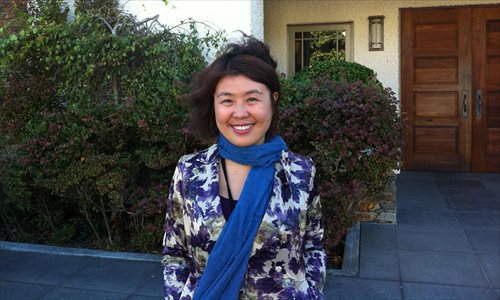HOME >> METRO SHANGHAI
Research shows that self-employed people are the happiest
By Wang Han Source:Global Times Published: 2016-1-6 19:48:01
The happiest workers in China, according to the "2015 Chinese Happiness Index" compiled by the magazine China Xiaokang and researchers at the Tsinghua University, are the ones without bosses. Being self-employed topped the Happiness Index for the first time last year. Previously government officials, teachers and civil servants have been the happiest.
There are obviously good reasons why being self-employed makes people more content - they can arrange their work schedules the way that suits them and they never have to suffer office politics or gossip.
And being self-employed, for many is more profitable than working for someone else. A report released by Ganji Inc, a Chinese online and mobile-based classified advertising operator, revealed that around 68 percent of O2O (online to offline) freelancers earn 5,000 yuan ($770) a month, with 9 percent earning more than 10,000 yuan. The average monthly salary of an office worker in Shanghai is about 5,451 yuan in 2014, according to Shanghai Municipal Human Resources and Social Security Bureau.
There are also many disadvantages for people considering taking the plunge and working on their own - unpredictable earnings, a reduced circle of friends, and no welfare insurance are among major concerns for the self-employed.
But variety is the key here. The Global Times talked to three very different people about their experiences as self-employed workers.
Own timetable
"It is true that I can arrange my work around my own timetable, but there's no real freedom without hard work," said Yao Huan, a 27-year-old freelance interpreter.
Yao is self-disciplined and hardworking and at any time will be working on several different projects which also give her multiple income streams. Not all of these are language interpreting - she cannot support her lifestyle in Shanghai with interpreting work alone at this stage.
Whenever she has time to spare she is usually studying at home or in a library.
"At present I am studying in my spare time to prepare for the CATTI (China Accreditation Test for Translators and Interpreters), the officially recognized test for interpreters in China. If I am lucky and get a CATTI certificate, I hope to be able to do conference interpreting and big translation projects in the future," Yao said.
She said there was fierce competition in the translating world in Shanghai - speaking fluent English is no longer a great advantage in this very international city. The only way, she feels, she can improve her income is to offer clients a more varied service (for higher fees, of course) and be prepared to do conference or simultaneous translating. As well as English, she is studying French and Spanish.
After graduating from a university in Hunan Province, Yao came to Shanghai in 2012, and had conventional jobs before taking up as a freelancer in 2014. "I was working for other companies for two years and I got tired of the office workers' nine-to-five routine life and the complicated office politics. I was inspired by a traveling blogger - I heard my heart telling me to seize the day and do the things I wanted to. So I quit my job and began my freelance career," Yao told the Global Times.
Working for herself was harder than she imagined at the beginning. In the early days she had a few odd jobs as an English-speaking tour guide and exhibition interpreter. But she seized every little opportunity and accumulated more and more clients over time. "If people are happy with your work, they'll come back. It is important for freelancers to build up long-term relationships with their clients," Yao said.
The money an entry-level interpreter can expect is not bad. "I earn an average 6,000 yuan a month, and sometimes even 10,000 yuan. Experienced simultaneous interpreters can make 20,000 to 30,000 yuan a month," Yao said.
But because her income is not predictable, she has had times when she has struggled to find the money to pay her rent. And she has had clients who have offered work but then cancelled at the last minute.
Sense of freedom
For young entrepreneur Cao Ximeng, being self-employed gives her a sense of freedom in her life. "I used to be told to do things that my conscience disagreed with but now I wake up every morning motivated to work hard and put my own ideas into practice," she told the Global Times.
With a bachelor degree in finance and marketing from the University of British Columbia in Canada, Cao spoke fluent English and had good intern experience in finance, fashion, and consulting. She could have taken a well-paid job with several companies but chose to go on her own.
After graduation Cao worked in new media industry but found the job was tedious and she had no time to herself. Thinking about starting her own business she realized that many of her friends at that stage were having babies and looking for foreign babycare products.
The development of O2O platforms is providing new opportunities for entrepreneurs. A growing number of Chinese people have been setting up stores and selling products online. Cao also saw the huge market potential of online business, and came up with a plan to set up an online shopping website specializing in foreign babycare products.
At first, her plans for the online store were nothing more than some scribbles in her notebook but she and her partners began undertaking the necessary but dull practical work, contacting overseas suppliers and offering to act as agents.
"Though many brands didn't give us any feedback, once one brand showed an interest in working with us we became encouraged again and went back to emailing and calling. Now more than 20 foreign brans are working with us," Cao said.
She believes her internship and work experience helped pave the way for her independent career. Her experience in new media familiarized her with advertising and branding on social networks. Her experience as a consultant taught her how to approach potential clients. But being self-employed, the way she is now, is the ideal position for her.
Cao said she wasn't earning as much as some people thought she might be because she was ploughing much of her earnings back into the business. She is also grateful that her family has given her support - economically and emotionally. "I have to admit that my family doesn't expect me to earn money at this stage so I can stay calm and focus on putting my ideas into practice rather than worry about profits in the short term," she said.
Learning to focus
It is the independence of being self-employed that really appeals to writer and filmmaker Tao Li. "I think the best thing about my independent career is that it brings my voice to a wider social group and allows my ideas and values to have a bigger impact on society," she told the Global Times.
For her working as a freelance creator is not about her personal freedom but her desire to help free a larger part of society. Creative work attracts a lot of self-employed people for various reasons -a recent LinkedIn report showed that, 46 percent of the self-employed registered on its website were working as designers, filmmakers, painters, performers or musicians.
Tao first worked as a documentary producer at a television station in Wenzhou, Zhejiang Province, a post that gave her good experience but she felt, after a while, it was limiting. She packed everything up, one day, and went to New Zealand for a new beginning.
In Wellingotn, New Zealand, she studied filmmaking at Victoria University and opened her own studio while teaching at a local school.
She made a name for herself with her documentary film, Waves, which explored the lives of Chinese students in New Zealand and how they coped with cultural identity and fitted into a new country.
The film became one of the top 10 films in the 2006 New Zealand Film Festival and the next year her movie was introduced into secondary schools in New Zealand as a teaching resource.
"Youth, growth and cross-cultural experience are themes I always focus on in my works," said Tao. This year, her studio is making another film in Australia.
Looking back on her life, Tao thinks young people should try to gain as much industry experience as possible and build up their own social networks on major platforms like corporations and institutions before branching out on their own.
Increasing demand
Gu Jun, a professor of sociology at Shanghai University, explained why the number of self-employed workers is increasing in China.
"First, the demand for self-employed individuals is increasing in the market, and there are more channels for people to freelance. A second reason is that self-employed workers can now get respectable incomes. Third, self-employed work meets a young person's need for freedom and individuality. This work allows them to arrange work based on their own schedules, rather than follow company arrangement," he said.
But he warned that self-employment is not for everyone. "Self-employed workers need to have a positive attitude because sometimes business is good, but sometimes it is bad, and they need to survive the stress of an unpredictable income. Also, self-employed workers need to have good self-discipline and know how to arrange their time and work properly," Gu said.




Newspaper headline: When work is wonderful
There are obviously good reasons why being self-employed makes people more content - they can arrange their work schedules the way that suits them and they never have to suffer office politics or gossip.
And being self-employed, for many is more profitable than working for someone else. A report released by Ganji Inc, a Chinese online and mobile-based classified advertising operator, revealed that around 68 percent of O2O (online to offline) freelancers earn 5,000 yuan ($770) a month, with 9 percent earning more than 10,000 yuan. The average monthly salary of an office worker in Shanghai is about 5,451 yuan in 2014, according to Shanghai Municipal Human Resources and Social Security Bureau.
There are also many disadvantages for people considering taking the plunge and working on their own - unpredictable earnings, a reduced circle of friends, and no welfare insurance are among major concerns for the self-employed.
But variety is the key here. The Global Times talked to three very different people about their experiences as self-employed workers.
Own timetable
"It is true that I can arrange my work around my own timetable, but there's no real freedom without hard work," said Yao Huan, a 27-year-old freelance interpreter.
Yao is self-disciplined and hardworking and at any time will be working on several different projects which also give her multiple income streams. Not all of these are language interpreting - she cannot support her lifestyle in Shanghai with interpreting work alone at this stage.
Whenever she has time to spare she is usually studying at home or in a library.
"At present I am studying in my spare time to prepare for the CATTI (China Accreditation Test for Translators and Interpreters), the officially recognized test for interpreters in China. If I am lucky and get a CATTI certificate, I hope to be able to do conference interpreting and big translation projects in the future," Yao said.
She said there was fierce competition in the translating world in Shanghai - speaking fluent English is no longer a great advantage in this very international city. The only way, she feels, she can improve her income is to offer clients a more varied service (for higher fees, of course) and be prepared to do conference or simultaneous translating. As well as English, she is studying French and Spanish.
After graduating from a university in Hunan Province, Yao came to Shanghai in 2012, and had conventional jobs before taking up as a freelancer in 2014. "I was working for other companies for two years and I got tired of the office workers' nine-to-five routine life and the complicated office politics. I was inspired by a traveling blogger - I heard my heart telling me to seize the day and do the things I wanted to. So I quit my job and began my freelance career," Yao told the Global Times.
Working for herself was harder than she imagined at the beginning. In the early days she had a few odd jobs as an English-speaking tour guide and exhibition interpreter. But she seized every little opportunity and accumulated more and more clients over time. "If people are happy with your work, they'll come back. It is important for freelancers to build up long-term relationships with their clients," Yao said.
The money an entry-level interpreter can expect is not bad. "I earn an average 6,000 yuan a month, and sometimes even 10,000 yuan. Experienced simultaneous interpreters can make 20,000 to 30,000 yuan a month," Yao said.
But because her income is not predictable, she has had times when she has struggled to find the money to pay her rent. And she has had clients who have offered work but then cancelled at the last minute.
Sense of freedom
For young entrepreneur Cao Ximeng, being self-employed gives her a sense of freedom in her life. "I used to be told to do things that my conscience disagreed with but now I wake up every morning motivated to work hard and put my own ideas into practice," she told the Global Times.
With a bachelor degree in finance and marketing from the University of British Columbia in Canada, Cao spoke fluent English and had good intern experience in finance, fashion, and consulting. She could have taken a well-paid job with several companies but chose to go on her own.
After graduation Cao worked in new media industry but found the job was tedious and she had no time to herself. Thinking about starting her own business she realized that many of her friends at that stage were having babies and looking for foreign babycare products.
The development of O2O platforms is providing new opportunities for entrepreneurs. A growing number of Chinese people have been setting up stores and selling products online. Cao also saw the huge market potential of online business, and came up with a plan to set up an online shopping website specializing in foreign babycare products.
At first, her plans for the online store were nothing more than some scribbles in her notebook but she and her partners began undertaking the necessary but dull practical work, contacting overseas suppliers and offering to act as agents.
"Though many brands didn't give us any feedback, once one brand showed an interest in working with us we became encouraged again and went back to emailing and calling. Now more than 20 foreign brans are working with us," Cao said.
She believes her internship and work experience helped pave the way for her independent career. Her experience in new media familiarized her with advertising and branding on social networks. Her experience as a consultant taught her how to approach potential clients. But being self-employed, the way she is now, is the ideal position for her.
Cao said she wasn't earning as much as some people thought she might be because she was ploughing much of her earnings back into the business. She is also grateful that her family has given her support - economically and emotionally. "I have to admit that my family doesn't expect me to earn money at this stage so I can stay calm and focus on putting my ideas into practice rather than worry about profits in the short term," she said.
Learning to focus
It is the independence of being self-employed that really appeals to writer and filmmaker Tao Li. "I think the best thing about my independent career is that it brings my voice to a wider social group and allows my ideas and values to have a bigger impact on society," she told the Global Times.
For her working as a freelance creator is not about her personal freedom but her desire to help free a larger part of society. Creative work attracts a lot of self-employed people for various reasons -a recent LinkedIn report showed that, 46 percent of the self-employed registered on its website were working as designers, filmmakers, painters, performers or musicians.
Tao first worked as a documentary producer at a television station in Wenzhou, Zhejiang Province, a post that gave her good experience but she felt, after a while, it was limiting. She packed everything up, one day, and went to New Zealand for a new beginning.
In Wellingotn, New Zealand, she studied filmmaking at Victoria University and opened her own studio while teaching at a local school.
She made a name for herself with her documentary film, Waves, which explored the lives of Chinese students in New Zealand and how they coped with cultural identity and fitted into a new country.
The film became one of the top 10 films in the 2006 New Zealand Film Festival and the next year her movie was introduced into secondary schools in New Zealand as a teaching resource.
"Youth, growth and cross-cultural experience are themes I always focus on in my works," said Tao. This year, her studio is making another film in Australia.
Looking back on her life, Tao thinks young people should try to gain as much industry experience as possible and build up their own social networks on major platforms like corporations and institutions before branching out on their own.
Increasing demand
Gu Jun, a professor of sociology at Shanghai University, explained why the number of self-employed workers is increasing in China.
"First, the demand for self-employed individuals is increasing in the market, and there are more channels for people to freelance. A second reason is that self-employed workers can now get respectable incomes. Third, self-employed work meets a young person's need for freedom and individuality. This work allows them to arrange work based on their own schedules, rather than follow company arrangement," he said.
But he warned that self-employment is not for everyone. "Self-employed workers need to have a positive attitude because sometimes business is good, but sometimes it is bad, and they need to survive the stress of an unpredictable income. Also, self-employed workers need to have good self-discipline and know how to arrange their time and work properly," Gu said.

Self-employed workers are regarded as the happiest in China enjoying good money and no office politics.

Yao Huan

Cao Ximeng (right)

Tao Li
Photos: IC and courtesy of Yao Huan, Cao Ximeng and Tao Li
Newspaper headline: When work is wonderful
Posted in: Metro Shanghai